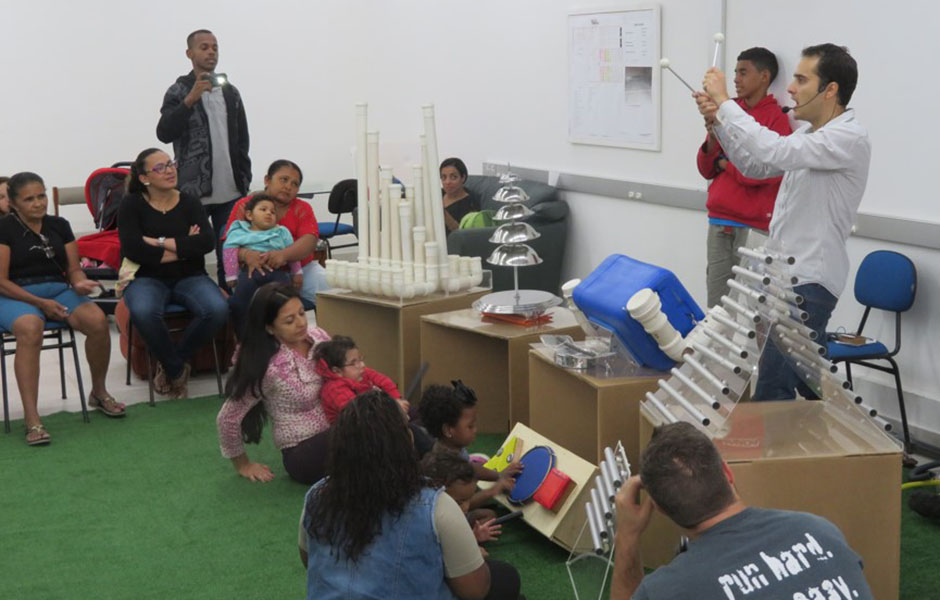July 9, 2018
ZikaPLAN’s NEURO-ZIKA neurological manifestations working group leader, the University of Liverpool, has been working with another working group member, Fiocruz, and the Brazilian Ministry of Health, the Brazilian charities ‘Uniao de Maes dos Anjos-UMA’ (Recife), ‘Associação Saúde Criança’ and Association Lotus (Rio de Janeiro) on patient and public engagement. The aims in this engagement are to share information on new research developments in Zika and the implications and consequences of congenital Zika infection and related disorders.
 Families attend an interactive music workshop in Rio de Janeiro, Brazil, December 1, 2017
Families attend an interactive music workshop in Rio de Janeiro, Brazil, December 1, 2017
All these institutions have collaboratively organized regular workshops and meetings to provide a forum to forge support networks between affected families and links with health professionals. The events address health and social inclusion matters. They provide information on Zika virus diagnostic methods, consequences of Zika virus infection and advice on managing issues associated with congenital Zika syndrome such as feeding difficulties, spasticity and seizures. The parents and care-givers are given practical advice on how to support their children holistically.
Sessions have included talks from specialist pediatricians, scientists and lawyers, as well as activities run by art, music and physiotherapists. The workshops have also provided opportunities for two-way education, such as local medical students and affected families meeting and working together to construct low-cost toys. The activities have been facilitated by the Brazilian charities, receive additional funding from the Medical Research Council and Wellcome Trust and are supported by the National Institute for Health Research (NIHR) Health Protection Research Unit in Emerging and Zoonotic infections.
There has been overwhelming enthusiasm amongst the families, local community and health professionals in the work so far. One mother attending a workshop with her 2-year-old boy with congenital Zika syndrome, stated, “Many thanks to everyone for the happiness, love and care for our children, so special and beautiful. I loved it”. Another father who had attended a physiotherapy workshop described how he now recognised his capacity to support his child, “I was able to learn many things that I can practise that can help to improve the quality of our lives”.
Raquel Medialdea-Carrera, PhD student at the University of Liverpool, who has led this work locally explained, “We have managed to bring more understanding around the science of Zika virus to the families that have been most affected by this epidemic. Since July 2017, we have been organizing these meetings and activities and have seen hundreds of families enjoy learning more about Zika virus and how to better stimulate their children while building bonds with other families and their community.”
Dr. Mike Griffiths, pediatric neurologist and researcher in Liverpool, who devised the program, stated “While developing and organizing these workshops and activities, we have been privileged to work with highly motivated partners, enthusiastic professionals and inspiring families. It has been a truly uplifting experience to help these families and watch parents gain confidence and practical skills not only to support their own children with congenital Zika syndrome, but also help others in looking after children with similar problems. With ZikaPLAN and others behind us, we hope to sustain the workshops in the cities and to continue to expand.”
The films made during the workshops are used to produce educational videos and resources that will extend the benefit of these activities to others affected by the disease and improve public awareness both in Brazil and internationally.
To find out more about these activities and the lives of those affected by the disease please see the links below: